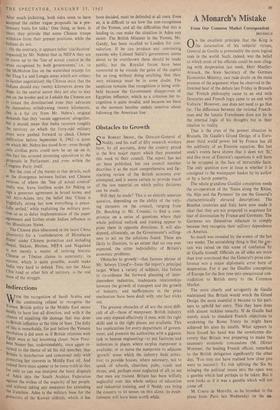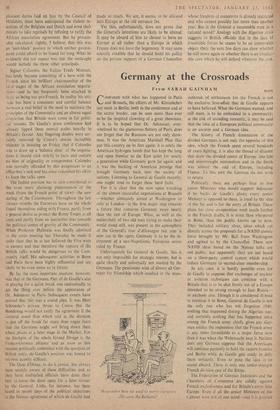A Monarch's Mistake
From Our Common Market Correspondent
BR USSELS
ON the excellent principle that the King is the incarnation of his subjects' virtues, General de Gaulle is presumably the most logical man in the world. Such, indeed, was the belief to which most of his officials could be seen cling- ing with desperation last week. Herr Mueller- Armack, the State Secretary of the German Economics Ministry, cast rude doubt on the main premise of the argument when he observed in the frenzied heat of the debate last Friday in Brussels that 'French philosophy came to an end with Descartes and French logic came to an end with Voltaire.' However, one does not need to go that far. The difference between the rational French- man and the lunatic Frenchman does not lie in the internal logic of his thoughts but in their relation to reality.
That is the crux of the present situation in Brussels. De Gaulle's Grand Design of a Euro- pean third world power led by France has all the sublimity of an Einstein equation. But last week's events have shown that it does not 'fit,' and like most of Einstein's equations it will have to be scrapped in the face of intractable facts. The only question now at issue is whether it is consigned to the wastepaper basket by its author or by a harsh posterity.
The whole grandiose Gaullist conception needs the co-operation of the 'States along the Rhine, the Alps and the Pyrenees' (to use the General's characteristically elevated description). The Benelux countries and Italy have now made it clear that they are not prepared to acquiesce for fear of domination by France and Germany. The Germans are themselves reluctant to comply because they recognise their military dependence on America.
So much was revealed by the events of the last two weeks. The astonishing thing is that the cur- tain was raised on this scene of confusion by de Gaulle himself. Officials on all sides are more than ever convinced that the General's press con- ference was a major diplomatic error born of desperation. For it put the Gaullist conception of Europe for the first time into unequivocal con- tradiction to British entry to the Common Market.
The more clearly and arrogantly de Gaulle maintained that Britain would wreck the Grand Design the more essential it became to his part- ners to uphold her entry. This they have done with almost reckless tenacity. If de Gaulle had merely stuck to standard French objections to weakening the Rome Treaty he might have achieved his aims by stealth. What appears to have forced his hand was the unwelcome dis- covery that Britain was preparing to make the necessary economic concessions (M. Olivier Wormser, the leading French official, remarked to the British delegation significantly the other day, 'You may not have realised how close you were to success'). To risk splitting the Six by bringing the political issues into the open was a gamble which had perhaps to be taken. But it now looks as if it was a gamble which will not come off.
M. Couve de Murville, as he brooded in the plane from Paris last Wednesday on the un- pleasant duties laid on him by the Council of Ministers, must have anticipated the violent re- actions of the Belgians and Dutch and even their threats to take reprisals by refusing to ratify the African association agreement. But he presum- ably calculated, rightly, I believe, that this was an 'anti-black' posture in which neither govern- ment could afford to be found for long. What he evidently did not expect was that the onslaught would include the three other principals.
Signor Colombo, the Italian Trade Minister, has lately become something of a hero with the French since his brilliant chairmanship of the 1;n tl stages of the African association negotia- tions--and he has frequently been attacked in )lady as being too pro-French. In reality his atti- aide has been a consistent and careful balance between a real belief in the need to maintain the principles of the Community and an almost equal conviction that Britain must come in for politi- cal reasons. De Gaulle's press conference had already tipped these mental scales, heavily in Britain's favour. Any lingering doubts were cer- tainly removed by Couve's almost incredible blunder in insisting on Friday that if Colombo was to draw up a 'balance sheer of the negotia- tions it should stick strictly to facts and contain no hint of originality or compromise. Colombo was mortally offended by this assignment to an office-boy's task and has since redoubled his effort to keep the talks open.
The Italian position has in turn contributed to the even more alarming phenomenon of the week (from the French point of view)—the new of the Commission. Throughout the last sixteen months the Eurocrats have on the whole found themselves siding with France, partly from a general desire to protect the Rome Treaty at all costs and partly from an instinctive bias towards the political centre of gravity of the Community. When Professor Hallstein was finally admitted to the crisis meeting last Thursday he made it quite clear that he at last believed the Five were in earnest and that therefore the rupture of the British talks would be dangerous to the Com- munity itself. His subsequent activities in Bonn and Paris have been highly influential and are likely to be even more so in future.
By far the most important reaction. however, was that of the Germans. Part of de Gaulle's aim in playing for a quick break was undoubtedly to get the thing over before the appearance of Dr. Adenauer in Paris. Subsequent events have proved that this was a sound plan. It was Herr Schroeder's private threat to Couve that the Bundestag would not ratify the agreement if the General stood firm which told in the decision to put off the break far more than vague fears that the Germans might not bring down their wheat prices at a later stage in the Market. For linchpin of the whole Grand Design is the Franco-German alliance and as soon as this became politically embroiled with the question of British entry. de Gaulle's position was bound to become acutely difficult.
The Quai d'Onsay, to do it justice, has always been acutely aware of these difficulties and as they have multiplied officials have done their best to leave the door open for a later retreat by the General. Little, for instance, has been heard in recent days of the political objections to the Nassau agreement of which de Gaulle had made so much. We are, it seems, to be allowed into Europe at the old entrance fee.
Yet this, unfortunately, does not prove that the General's intentions are likely to be altered. It may be absurd of him to choose to have no Europe at all rather than a Europe in which France does not have the hegemony. It may seem scarcely credible that he should build his policy on the private support of a German Chancellor whose freedom of manoeuvre is already restricted and who cannot possibly last more than another year. But is the General a reasonable man in a rational mood? Analogy with the Algerian crisis suggests to British officials that in the face of irresistible forces he ceases to be an immovable object. Only the next few days can show whether he will move again or whether there is an irreduc- ible core which he will defend whatever the cost.



































 Previous page
Previous page